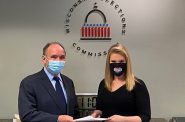Foxconn Could Be Environmental Disaster
Marginal jobs for enormous tax subsidies, plus air and water pollution.

Foxconn chairman Terry Gou and Governor Scott Walker signing a memorandum of understanding. Photo by Jeramey Jannene.
Chatter among Wisconsin’s business, media and political classes has sucked all the clean air out of the room in contemplating news that Taiwan-based electronics assembler Foxconn perhaps will build a gigantic factory in the state. Foxconn is the biggest assembler of electronic devices in the world.
All this romance over a firm whose operations in China have been criticized for a 19th century approach to the workplace, which is to suggest surprisingly inhumane conditions, the kind that literally drive some workers to suicide.
According to reports in the Milwaukee Journal Sentinel, Wisconsin taxpayers may have to underwrite $3 billion in giveaways to Foxconn to get it to build a plant somewhere in southeastern Wisconsin. So much, if that happens, for the fiscally prudent leadership of Gov. Scott Walker and his fellow GOP spenders in the state legislature. As the Journal Sentinel also reported, those sums are sizable multiples of the biggest public incentives ever awarded before by the state to Wisconsin businesses.
Meanwhile, Republican-managed state government has been whacking public educational support by the billions of dollars, including austerity cuts to the once top-tier, R&D powerhouse University of Wisconsin. Now we see where those savings effectively might effectively be redeployed: On a private factory floor. A really, really big factory floor, but still. In Wisconsin and across this nation, political needs trump science and economics with increasing alacrity.
I did a back-of-envelope calculation: Start with the high end of the reported public tax subsidy. Then assume the plant would eventually employ 10,000 workers (it might be 3,000 to start, apparently). In that case, if it could deploy these funds entirely on salaries, Foxconn could receive enough public tax dollars to go a decade or three before needing to spend a single dime of its own. Beyond that time frame, big-box operators are notoriously cranky when it’s “give us more aid or we might have to pull out” renegotiation time.
But beyond all this wrangling uncertainty we surely will face the under-discussed issue of environmental impacts. According to the Journal Sentinel, Foxconn was attracted to Wisconsin (and potentially Michigan) because of the bordering Great Lakes and their plentiful supply of fresh water, an increasingly rare resource worldwide.
A factory of Foxconn’s anticipated size could require millions of gallons of water per day. On paper, Lake Michigan could supply that. But you may ask yourself: What do electronics manufacturers do with all that water? Where does it go when they’re done with it, and in what condition?
Many people might regard electronics as a clean industry, what with all those iconic “white rooms” and workers in high-tech protective gear. Fact is, electronics is a dirty business; no black smoke coming out of a stack, surely, but invisible nasties all the same. Modern micro-circuitry depends on exotic metals and powerful, even acidic chemical treatment of them. The water is used to wash off the product when it is newly manufactured, to remove dust and other impurities.
Environmentally there are two potential sub-issues to consider here: The first issue is what discharges would leave the plant, to what extent they would be treated, and what kinds of costs if any this might exact on public treatment systems. The other issue involves what impurities would be captured in such a plant but still ride home with the employees.
Let’s assume the state and Foxconn strike a deal and the plant indeed locates in Wisconsin near Lake Michigan and the often-mentioned cities of Racine or Kenosha, which have massive unused water system capacity. Foxconn’s used water — possibly tainted with toxic metals and other contaminants — then will need to be returned to the Great Lakes watershed.
Across the last century, Wisconsin struggled with pollutant discharges into rivers and lakes from tanneries, heavy-metal fabricators and other industrial processes. Water treatment was less advanced or non-existent during much of that era. While treatment today is substantially better, it isn’t perfect nor is it cheap.
Could the public trust today’s business-centric Wisconsin Department of Natural Resources to ensure that Foxconn discharges meet EPA standards and are free of exotic impurities? Especially given that the plant and its political origins instantly would become the billion-dollar elephant in the room? Maybe EPA standards aren’t good enough. Maybe the sponsoring city’s sewage treatment plant nevertheless will be capable of processing these discharges. But until there’s advance assurance in writing, maybe you shouldn’t drink the water.
But maybe you should hold your breath, because the other environmental issue here is that airborne toxic discharges are a big threat to workers in such electronics plants, not just in the third world but the US which still does too little to protect them. From a 2015 Slate.com story on pollution-afflicted workers in US electronics plants:
..The damage, it turns out, isn’t confined to the workers themselves. Building on science more than a century old, recent studies have found ties between parental exposures and childhood afflictions such as brain tumors, malformations, and learning disabilities. A bi-coastal consortium of toxic-tort lawyers has begun targeting electronics manufacturers, blaming chemical-intensive processes for skeletal abnormalities, developmental delays, heart defects, and other problems in workers’ children.
Elsewhere in the same dispatch, there is this:
There are not enough government protections for the types of exposures that occur,” said Tracey Woodruff, director of the Program on Reproductive Health and the Environment at the University of California–San Francisco. “OSHA’s not even really dealing with cancer, so this is another order down.
Indeed, OSHA itself says that many of its exposure limits for dangerous substances don’t offer sufficient protection for workers. Parsing 30 years of agency data, the Center found that when air samples across all industries tested positive for teratogenic mercury vapor, they were above the legal limit less than 1 percent of the time. But a third of the samples topped the much stricter limit recommended by the National Institute for Occupational Safety and Health.
For technical wonks, here’s a solid, 1997 technical overview of the environmental issues of a Foxconn type operation, from (of all places) the World Bank. It’s daunting. Donald Trump and Walker will never read it.
Foxconn may turn out great, and lead to better days for Wisconsin, but before auto-genuflecting toward profit-driven foreign firms that basically are focused on finding megatons of cheap water along with cheap wages in a market-handy, right-to-work state, someone in the public sector with professional skills had better begin doing their homework, assessing real physical risks against presumed economic benefits. Because once a plant like this opens, that kind of assessment may be too late.
Ron Legro is a Milwaukee-based journalist who has worked in the high-tech industry and in state and local government. He recently wrote “The Man Who Painted the Universe” with co-author Avi Lank (Wisconsin Historical Society Press).
Op-Ed
-
Why Vote for MPS Funding Referendum
 Mar 30th, 2024 by Nehemiah Edwards
Mar 30th, 2024 by Nehemiah Edwards
-
Wisconsin’s Very Own Rudy Giuliani Should Not Oversee Judicial Ethics
 Mar 25th, 2024 by Richard Niess
Mar 25th, 2024 by Richard Niess
-
Voting at Wisconsin’s Universities Isn’t Easy
 Mar 17th, 2024 by Nicole Laudolff
Mar 17th, 2024 by Nicole Laudolff
















Look ahead at little indeed.
-We are still cleaning up the Fox River through Appleton.
-The Green Bay has recurring ” dead zones”.
Within a day or two of my above posting’s original appearance last week, Gov. Walker sent a proposal to the legislature for quick action that includes major clawbacks of current state environmental laws and regulations. You couldn’t trust DNR managers right now to do the right thing while we still have those vital protections, implemented after decades of tearful, dramatic evidence that without them we are poisoning ourselves. Now what? Anything goes, if necessary to achieve this huge political win. Only, it won’t remain a political win for very long if newly relaxed environmental standards poison communities and re-toxify the Great Lakes.
Monster Inc. is running Wisconsin. Hopefully, this abomination will fail before it comes to fruition, but until then it will be a feather in Scotty’s reelection cap.
Another “Sky-is-falling” opinion by an uninformed Chicken Little who must not realize there are other agencies and regulatory bodies that govern the Great Lakes, besides Wisconsin.
ANY plant discharging water into Lake Michigan (if that is where the used water is going to go) needs to insure the waste water has been treated. This even goes beyond US regulations.
There is a BiNational Agreement between the US and Canada in regards to dumping chemicals into Lake Michigan (and ALL the Great Lakes). That agreement has a specific Annex in regards to dumping chemicals into the Lakes.
ANY water that comes out of that plant has to be treated and if they are spending that much money, I am sure they have full provisions to meet those water standards and build the recycling systems that are a part of the total manufacturing process.
Here is the part of that BiNational Agreement – https://binational.net/annexes/a3/
Stop running around like Chicken Little and saying tainted water is going to flow into Lake Michigan. No regulatory policy has been waived by this BiNational Authority and I truly doubt it ever would be.
Also, citing a 20-year-old document and saying Trump and Walker probably did not read it is pure Boogeyman rant. There are newer studies citing newer techniques as to scrubbing water and using different filtration techniques to recycle the used water.
“Technical wonks” would just laugh at your amateur attempt to use 20 year old information to scare people when there are newer papers that discuss the newer approaches which need to be incorporated into the operations of the plant.
Water treatment is NOT an option for a plant manufacturing semi-conductor components. It’s a must-have and clearly understood by manufacturers.
JC, even if Lake Michigan is protected by international agreements (and I’m not sure what those are worth with Trump and Pruitt in charge), the Mississippi River is not, and some of the land under consideration is beyond the Lake Michigan watershed.
The Lake Michigan watershed is even narrower in Kenosha County than in the Milwaukee area. In southern Kenosha County, even I-94 is outside the Lake Michigan watershed; it’s drained by the Des Plaines River which (eventually) drains into the Mississippi.
What if Foxconn built a plant that straddled the Lake Michigan watershed? What would stop them from drawing Lake water but discharging into the Mississippi (via the Des Plaines River)?
That sounds like an environmental disaster to me.
Tom D
It’s not “even if Lake Michigan is protected…” – IT IS!
What I don’t like about all these Chicken Little opinions about how “The Sky is Falling” is that they do not think any of these things out.
Do ANY of you really think in a $10 Billion facility, they are not going to have any water treatment facility which is a standard accepted industry practice?
AND, citing a 20-year old study on how to clean up water is ludicrous. There are better techniques and common sense would have you to believe, they are going to build a state–of-the-art facility to recycle the water using the latest capabilities including ultra-violet techniques which weren’t even around 20 years ago.
What it? What if? What if? – Let’s see the detailed plans before getting into hypothetical questions.
If nothing else, you and probably 99% of the readers learned that there is a BiNational Agency overseeing the quality of water in Lake Michigan. Something the author either didn’t know about OR failed to disclose in his “Sky is Falling” article.
Let’s stay logical in our review of this project and not fail to recognize safeguards AND standard industry practices that are well-accepted in the industry.
It’s not “chicken little” to follow state and federal environmental regulations. But it is chicken droppings when plilant, overly eager politicians marginalize and minimize those regs to rush a project into development on a self-serving, all too hasty timetable. And it’s full-blown BS when politicians actively undermine the actual regulations, much less do the painstaking work to protect the state’s natural resources and citizenry.
I’m not worried about the sky falling, but I am concerned that too many politicos and citizens such as yourself are all too willing to take a faith-based approach to these issues. Foxconn is going to build a “state of the art” facility in terms of environmental standards? You don’t know that and neither does the DNR in its weakened, pliant state,. The “binational” agency doesn’t exist as an enforcement agency. It’s a set of protocols limited to issues along boundary waters. Foxconn is not locating near an international boundary. Nor if it were is the International Joint Commission an enforcement agency with staff in the field.
Having safeguards on paper in the form of laws is not the same asexecuting the work necessary to ensure compliance and the governor’s proposal gives Foxconn a complete pass or undue discretion to run the environment in its own sprawling version of Disneyland..The porposal even hands over some DNR powers to Foxconn. letting tgfe furn re-engineer natural water pathways within the enterprise zone to its liking. Trust the foreign corporation to do what’s best in its own interest? Smell the coffee, please.
Ronald,
Your lack of even knowing there is a BiNational Agreement that protects the Great Lakes shows your level of understanding of the issues.
Your comment — “The “binational” agency doesn’t exist as an enforcement agency. It’s a set of protocols limited to issues along boundary waters.”
– You HAVE to be kidding. ANYTHING that deals with the Great Lakes is a BIG deal and cannot be “Waived off” as you think it can.
Accusing everyone involved before you can even review the blueprints is pretty Chicken Little if you ask me.
AND, clearing the way to do a fast-track development by waiving some of the zoning/ environmental issues is not unheard of. The ones they are waiving do not pertain to water recycling or purification. That would be outright reckless and no one is advocating that.
Again, a $10 Billion facility is going to have adequate water treatment facilities built in. I will believe YOUR statements when I see the blueprints and they are not there.
If they are not there, I will the first to object to the project. Until then, let everyone proceed with this endeavor and have some confidence in it.
So what’s your Master Plan to get Wisconsin moving forward? More government jobs? More “shovel-ready” projects that are a “feel good” idea, but in reality have no place as 21st careers.
Ronald,
Your Bio says you were in local and state government. In what capacity?
Did you oversee ANY developments when you were in them?
Were you an elected official? Did you have any review of water filtration plants and/or water recycling sewerage-processing plants?
Ever work in creating a TIF district for regional economic development?. Ever review infrastructure supporting new businesses or commercial development?
If you did, you would know the complexities in dealing with ANY commercial/ industrial development being established in a community. This is a mega-development.
The plans will be complex and I am sure many will be reviewing it.
Zoning boards can waste a lot of development time when their big issue that they get hung up on is whether or not the curb in the back parking lot should be 3″ and not 3 1/2″. That is the minutiae that should be waived or fast-tracked.. (I have been in meetings like that)
Water treatment/ water recycling facilities are not minutiae.
JC, you’re just talking past me. The “binational agreement” doesn’t do what you think it does. As I already noted, the International Joint Commission has no direct enforcement power in the case of Lake Michigan shoreline development on the U.S. side. The Great Lakes Compact would come into play if Foxconn’s site straddled the watershed and the firm sought to drink from the lake while shipping its wastewater westward. None of that obviates the DNR’s role as the state’s one and only regulatory agency overseeing permits. But the governor seeks to obiviate those requirements, bypassing the normal process. Read his proposal. It’s online. Everything else is just idle trolling. Especially when you run online searches on me and begin trying to turn this discussion into some kind of personal inquisition. Don’t change the subject. But since you asked:
I covered large-scale environmental issues in my career as an award-winning journalist, including the ’70s flap over nuclear power plant siting issues that led the state Public Service Commission to tighten site requirements. The former Wisconsin Electric (which firm years later I worked for) planned to build a fission plant on an inland lake so shallow the thermal pollution would have been problematic, at best. The utility backed off, but the fight by residents to protect lake and shoreline took years because they and the utility respected the legal and regulatory process, and so did elected officials. That’s called democracy. I realize today’s breed of politicians are impatient — there’s another election coming, don’t you know. But doing things the right way in no way involves rushing to judgment.
I did have regulatory authority in one of my civil servant jobs, although it wasn’t environmental in nature. What I saw in my years of service was private industry skirting rules, intentionally or otherwise, in the quest to maximize profit, causing grief and expense to consumers. Your faith that “many” will review fast-tracked plans for the development belies what the governor is asking the legislature to do. He, and you, cannot have it both ways.
Fast-tracking permits for Foxconn — as in the case of the legislature’s decisions to fast-track all mining permits — is by definition diluting the process of review. It’s getting less information in a shorter amount of time and granting prior boons regardless. It’s like baking a cake for only 10 minutes instead of an hour because you’re hungry now, and like using inferior ingredients because you don’t have time to hit the grocery first. It’ll be an awful cake, but, hey, we need this cake now!
Finally, this state’s Public Trust Doctrine, borne of the Wisconsin Constitution and codified by the state Supreme Court and lower courts, says that citizens and residents have rights to water that is accessible and safe to use. The DNR is charged with enforcing these rights. Unfortunately, this governor and this legislature have been chipping away at those rights. A law or even a constitutional provision are useless if our elected officials and public agencies ignore their responsibilities. The Supreme Court ruled that that when DNR staff reviews projects that could impact Wisconsin lakes and rivers, they must consider the cumulative impacts of individual projects in their decisions. Our current breed of elected official — executive, judicial and legislative — has undermined this long-standing decree, chipping away at it to the point where the DNR is now instructed that it needn’t always consider impacts on neighbors or the environment in general when considering any particular water-impact case. But a non-holistic approach to enforcement is no approach at all — it is a license to be murky, and to let the waters be murky. And because politicians are leery that the DNR won’t always make the call in the way they would like, they have now deeply cut the agency’s scientific and enforcement staffing — not just in considering water issues but for all aspects of environmental impacts, air and land included. Those politicians essentially are saying that what you don’t know about — and now can’t as easily learn about — cannot hurt you. Righhhhht.
Ronald
Again it’s a lot of premature Chicken Little ranting. I don’t need to do any search on you personally.
Now, you know all about the BiNational Agreement, but before you did not even mention it or mention that is DOES have impact. (it does)
You did not mention the Federal EPA which would also kick in when it comes to Lake Michigan (due to the BiNational Agreement) as well as any waterway in Wisconsin.
You also don’t include surrounding states who would be in a total uproar if you started polluting the Lake including Illinois (Chicago), Indiana, and Michigan. It’s more than just the Wisconsin EPA/DNR that would have input.
Use your own example of “baking the cake” for only 10 minutes instead of an hour and taking some shortcuts on ingredients.
Your article ranting, demonizing and criticizing about the “finished product” before it’s even put into the oven to bake screams volumes as to your lack of “giving it sufficient time” before making any fair assessment on it.
That was your argument for the review process – “give it sufficient time”.
Well, the cake hasn’t even been mixed, let alone put into the oven – and brought out, yet you are already demonizing the finished product as “Could Be Environmental Disaster”.
“It’s too cold.” “It’s going to come out too hot.” “It isn’t flaky.” “I don’t see chocolate sprinkles on it.” “The dough is tough.” The cake has not even been mixed,, let alone put into the oven.
Give it some time.
(I’ve had hands-on experience on both government and private diverse developments, also TIF districts, water filtration plants, large campuses, etc. too early to be so critical)
JC: It’s never too early to ask questions, and I’m hardly alone, as many third-party observers and not just environmental activists are raising concerns about the governor’s approach. I suppose the gov would prefer I suck a lemon now and only pucker my face after it’s too late, but I have rather different ideas about civic mindedness.
Putting the cart before the horse, the Walker and Ryan PR noise machines are pumping out paid campaign ads praising themselves and Foxconn at high volume, but I and other like-minded individuals and groups should not dare squeak? Let’s have a sense of proportion here. The first hearing on this project in the state Assembly is happening as I write this and, as has been the custom of late, the chance for skeptics to speak to their representatives will be almost an afterthought late in the day. Interesting how fast our current political hegemonists can jump on pet projects such as this, yet be so far from resolving their larger fiscal obligations. As usual, it’s obvious they’d prefer not to have to listen to the public at large.
You say I now know all about the “binational agreement.” Actually, you would know all about it if you followed my cues and did some actual homework. I didn’t mention the IJC in my original post because, as I have noted in comments reacting to you twice now, the commission is not set up to conduct project-specific environmental reviews, much less handle licensing or permitting (and by the way, it did not have a role in ruling upon the Waukesha water diversion, which was the mission of the Great Lakes Compact led by governors, which group has a counterpart in Canada, and neither of those groups does permitting and licensing, either). It surely would be worth considering whether Canada and the US should formally review all major projects of any kind potentially affecting the Great Lakes, but that is not the case now. It’s the DNR or see ya in court, baby.
Nor is the EPA any longer some kind of insurance policy. It’s run by a Trump-appointed industry executive who is … anti-EPA! And busies himself gutting that agency’s capabilities in much the same way Walker and his pals have gutted DNR. With great power comes great responsibility. None showing around these parts, lately.
Regarding another of your comments, Michigan and other Great Lakes states that would like to have this plant probably won’t scream about Wisconsin short-stopping environmental review and licensing, because they would in all likelihood want to do the same thing, in order to please Foxconn. But it’s not just about pleasing one corporation that is willing to locate in a state that will happily surrender mega-bucks and its eldest child for the opportunity. It’s about protecting citizens and natural resources — in advance and throughout the plant’s life.
If someone (the governor in this case) describes how they and their mutual patron Fconn are going to improperly mix a cake and bake it improperly, it’s easy to predict unhappy outcomes. The problem here is even worse, because the DNR is going to be prevented from even asking some of the more critical environmental questions as a condition of licensing.
The governor would like that Fconn doesn’t have to share important details of how it is making its cake and what’s inside, or how it will dispose of any resulting kitchen mess. Even though it’s using our money and our kitchen. You expect the result is going to be delicious but you have paid no attention to what Fconn has cooked up heretofore. We won’t be able to watch some of the cake-making and the oven door has no window so there’s no transparency while it’s baking. Plus Fconn plans to force-feed its hosts when and however the dessert turns out. — ideally f decades. Sounds like the seventh circle of Hell to me.
“Could Be” – great reporting…